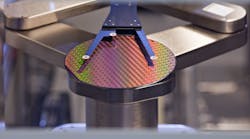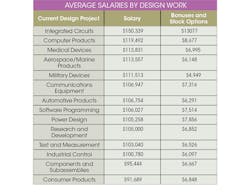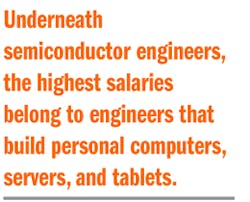The engineers that plot out circuits in everything from computer processors to power management chips earned vastly higher salaries this year than engineers using them to build everything from robotic arms to medical devices. It is a longstanding trend in electrical engineering.
The average semiconductor engineer earned $163,416 including bonuses and stock options in 2016, according to a recent survey conducted by Electronic Design. The average electrical engineer’s total compensation was $113,250, according to the data. And it was almost $35,000 higher than the next biggest wage-earners.
The data shows that the semiconductor industry is still the highest bidder for electrical engineers, who are being asked to develop smaller and more power efficient for products ranging from computers and sensors to autonomous vehicles and security cameras.
For years, semiconductor engineers have far outpaced average electrical engineers. In 2015, the average semiconductor engineer’s salary was $22,000 higher than the average worker. In 2014, the salary gap was almost $30,000, according to data from previous Electronic Design surveys.
But semiconductor engineers are not immune to broader work concerns. “Salaries have gone up, but the industry’s long-term prospects are murky,” admitted one survey respondent. “I have students that are making as much in starting wage as I make,” said another engineer, “but the job market is overflowing.”
The fact that salaries have remained so high has also raised questions about how compensation will be affected by consolidation in the semiconductor market. That was an open question earlier this year when Analog Devices acquired Linear Technology in a $14.8 billion deal.
One of the biggest takeaways from this year’s survey is that engineering salaries are generally rising faster than inflation, but that concerns about a shrinking job market and outsourcing have hardened. And no industry had successfully avoided these concerns.
Younger engineers lamented that they would struggle to earn higher salaries as outsourcing provides cheaper labor for big companies and software removes some of the mysteries of designing products.
“As a millennial that was looking for my first job during the economic disaster period, it was a hirer’s market. I was low-balled on salary but took any work I could find out of college,” said one survey respondent. “I’ll probably never make the kind of money my co-workers made in the 90's.”
Underneath semiconductor engineers, the highest salaries belong to engineers that build personal computers, servers, and tablets. Further down the list are engineers that design medical, aerospace and marine, and military devices, which have strict demands on reliability and have to work in harsh environments.
Below them are engineers specializing in communications equipment, automotive electronics, power devices, test equipment, and research and development. On the lower end are engineers building consumer products, which have lingered toward the bottom of engineering salaries for years, according to Electronic Design’s data.
Many engineers pointed out that hardware engineers are not finding the same opportunities as software developers. At the same time, however, software developers are not paid significantly more than electrical engineers on average, defying the notion that they are reaping all the benefits of software swallowing the world.
Large companies and start-ups are investing in hardware engineers to design an array of new gadgets, ranging from servers to smart household devices. Google, for instance, has said that it used custom engineering to develop the innards of its Pixel smartphone, Home personal assistant, and artificial intelligence processors.
But software’s future is much brighter than electrical engineering. Jobs for software developers in the United States will grow from 1,114,000 in 2014 to 1,300,600 in 2024, according to the Bureau of Labor Statistics. On the other hand, electronics engineers will jockey for the profession’s remaining 316,000 jobs over the same period, the agency said.




